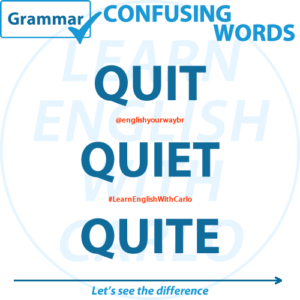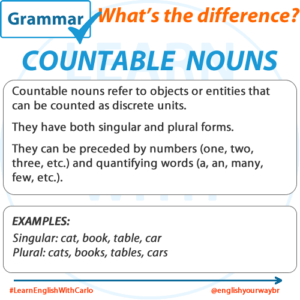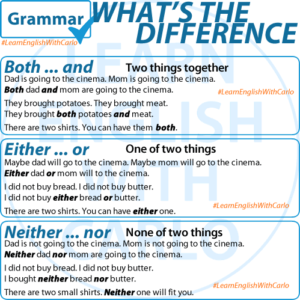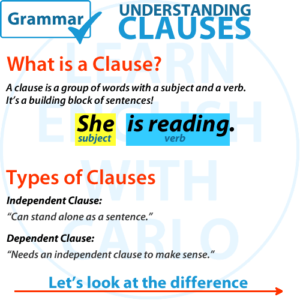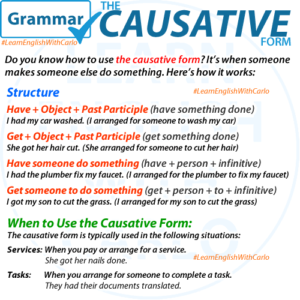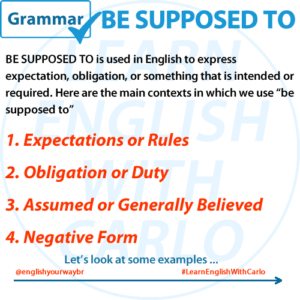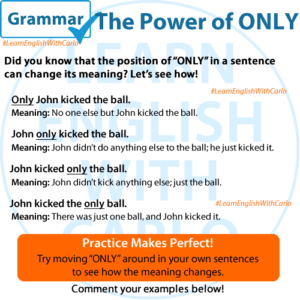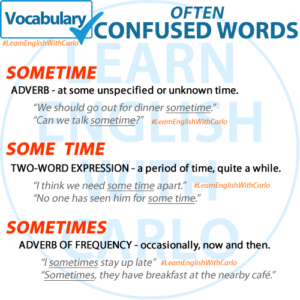Figures of speech are words or expressions used in a non-literal, creative way to make language more vivid and expressive.Writers and speakers use them to create imagery, add emotion, and make ideas easier to remember. They’re common in stories, songs, poetry, and everyday conversation. Literal: She is very smart.Figure of speech: She’s a walking dictionary. …
Category: GRAMMAR
Permanent link to this article: https://englishyourway.com.br/figures-of-speech-in-english/
Jan 10
CONFUSING WORDS – Quit – Quiet – Quite
QUIT “Quit” is a verb that means to stop or cease doing something. When someone quits an activity, job, or habit, they discontinue or give up that particular action or commitment. “Quit” can also imply resignation or abandonment of a task or responsibility. It is often used in contexts related to work, sports, studies, or …
Permanent link to this article: https://englishyourway.com.br/confusing-words-quit-quiet-quite/
Jan 09
GRAMMAR – Countable and Uncountable Nouns
Countable and uncountable nouns are two categories used to classify nouns based on whether they can be counted or not. Countable Nouns:Countable nouns refer to objects or entities that can be counted as discrete units.They have both singular and plural forms.They can be preceded by numbers (one, two, three, etc.) and quantifying words (a, an, …
Permanent link to this article: https://englishyourway.com.br/grammar-countable-and-uncountable-nouns/
Jan 08
GRAMMAR – Both – Either – Neither
Both … andTwo things togetherMom is going to the cinema. Dad is going to the cinema.Both Mom and Dad are going to the cinema.They bought potatoes. They bought meat.They bought both potatoes and meat.There are two shirts. You can have both this one and that one.. Either … orOne of two thingsMom and Dad have …
Permanent link to this article: https://englishyourway.com.br/grammar-both-either-neither/
Jan 05
Understanding Clauses in English Grammar
A clause is a group of words that contains a subject and a verb. Clauses are essential building blocks of sentences, and understanding them can help you improve your writing and speaking skills. Types of Clauses Clauses can be divided into two main types: What is an Independent Clause? An independent clause expresses a complete …
Permanent link to this article: https://englishyourway.com.br/clauses-in-english-grammar/
Jan 03
The Causative Form
The causative form is a grammatical structure used when one person causes another person to do something. It’s a common form in English and is often used to indicate that someone has arranged for an action to be done by someone else. Structure of the Causative Form There are two main ways to form the …
Permanent link to this article: https://englishyourway.com.br/the-causative-form/
Jan 01
Understanding “Be Supposed To” in English
English learners often encounter the phrase “be supposed to” in everyday conversations. It’s a common expression used to talk about expectations, obligations, rules, and assumptions. In this post, we’ll explore what “be supposed to” means, how it’s used, and the grammatical rules that guide its usage. 1. What Does “Be Supposed To” Mean? “Be supposed …
Permanent link to this article: https://englishyourway.com.br/be-supposed-to-usage-in-english/
Dec 31
GRAMMAR – Another and Other
Use of Another and Otheranother + singular noun (Have another sandwich.) another (Thanks. I’ll have another.) other + plural noun (I wonder if there is life on other planets.) determiner + other + noun (There may be life on some other planets.) determiner + other (“I have one book.” “I have the other.”) Another means …
Permanent link to this article: https://englishyourway.com.br/grammar-another-and-other/
Dec 30
Understanding the Correct Placement of “Only”
Using “only” correctly can make a big difference in the meaning of a sentence. It’s a small word with a powerful impact! Let’s dive into how to place “only” correctly to convey the exact meaning you want. Understanding the Role of “Only”: “Only” is a versatile word that can modify different parts of a sentence. …
Permanent link to this article: https://englishyourway.com.br/correct-placement-of-only-in-sentences/
Dec 25
Sometime, Sometimes and Some Time
These three words are often confused. So, here’s an explanation of the differences between “sometime,” “sometimes,” and “some time”: 1. Sometime: 2. Sometimes: 3. Some time: Usage Tips: Examples: Understanding these differences will help you use these words correctly in various contexts. Practice using them in sentences with the QUIZ below!
Permanent link to this article: https://englishyourway.com.br/sometime-sometimes-and-some-time/


